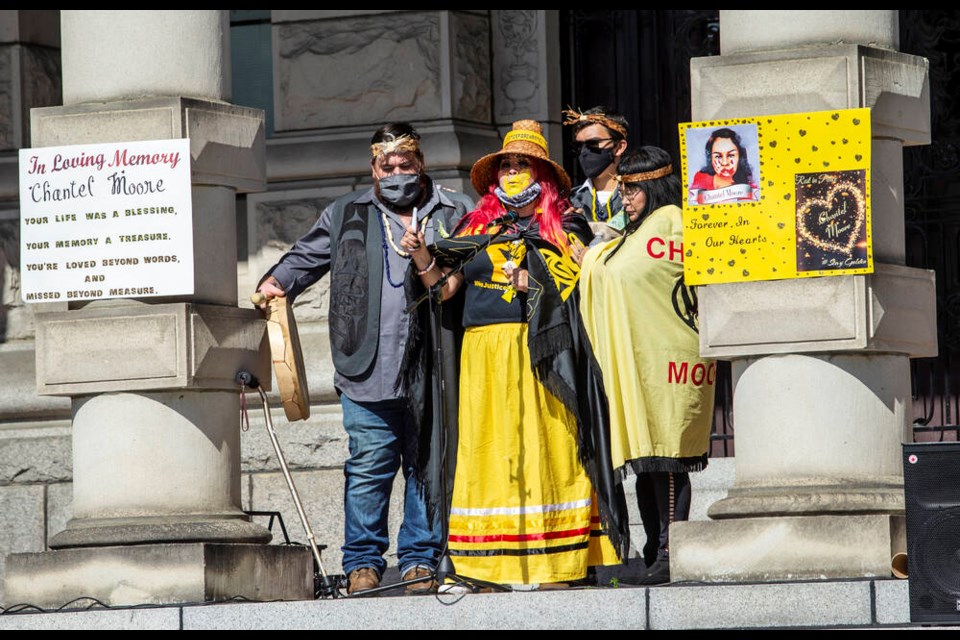A peaceful march seeking justice for Chantel Moore, the 26-year-old Indigenous woman shot to death in New Brunswick last year, turned ugly Saturday when a woman assaulted Victoria Police Chief Del Manak.
The chief had been invited to the memorial by Moore’s mother, Martha Martin, and had been honoured in a blanketing ceremony. As Manak, who was not in uniform, stood chatting in the crowd, a woman approached him from behind and poured liquid on him. He was not injured.
The woman walked away. As officers moved in to arrest her, a group surrounded her, then surrounded the officers. Five people were taken into custody.
Victoria Mayor Lisa Helps and Esquimalt Mayor Barb Desjardins, co-chairs of the police board, condemned the act, calling it “unacceptable.”
Until the assault, the memorial for Moore had stood in stark contrast to the rally of placard-waving anti-vaccine passport protesters.
Under the watchful eye of local police, hundreds of unmasked men, women and children gathered on the lawn of the legislature, listening to speeches, chanting and cheering. Dozens lined the sidewalk on Government Street, waving signs and inviting drivers to honk their horns. And many did — noisily and repeatedly.
Police deployed temporary cameras downtown to ensure public safety during the demonstrations. Assaults and property damage has taken place at recent demonstrations, police said.
The march for Moore, the Port Alberni woman who was shot and killed during a wellness check on June 4, 2020, by police in Edmundston, N.B., wound its way past the protesters to the back lawn of the legislature. Women wearing yellow ribbon skirts held banners with the photographs and names of Indigenous and black people shot by police.
No criminal charges were filed against the police officer who fatally shot Moore. Investigators said at the time that the young woman had approached the officer holding a knife.
Moore’s mother cried as she told the gathering she had lost two children. Her son Michael Martin died in at the Surrey Pretrial Services Centre on Nov. 14. It’s believed he took his own life.
“The system and wellness checks are not working for Indigenous people. What do we have to do so we don’t have to do any more of these gatherings?” Martin asked.
Martin is now inspired by her seven-year-old granddaughter to push for better policing and better wellness checks.
“Our children deserve better, and I won’t stop fighting for our children and the ones that have left,” she said.
Nuu-chah-nulth Tribal Council president Judith Sayers, who was in a plane crash seven weeks ago, said she has been granted a new life and she has things to finish — changing wellness checks among them.
“One of those things is to find justice for our Nuu-chah-nulth people and all First Nations people. And I want to help be that voice to stand beside Martha Martin and other families and say: ‘No more police shootings, no more police violence, no more police harassment.’ We all have to speak up so it will stop.”
Manak told the crowd that the first time Martin reached out to him to tell him about Moore, she also talked to him about her granddaughter Gracie, Moore’s daughter. He met with her and although he didn’t have the answers about what happened in New Brunswick, “I was able to listen to her, look into her eyes and see the pain and sorrow and sadness that she had.”
At that meeting, Manak said, he made a commitment to do everything in his power as police chief to make changes in the name of Moore and to make sure the police department would do better in its police checks.
“It’s not all talk. And the commitment I made to Martha and her family in the name of Chantel I am carrying forward with a number of actions,” he said.
For several years, the department has been working with the Aboriginal Coalition to End Homelessness. Officers have been building relationships with Indigenous people on the street, Manak said. Next month, he is meeting with members of the Esquimalt Nation to present a plan for building relationships in the future.
“I’m committed, as a person of colour, to bridge those gaps and to make our police organization better connected so there are higher levels of trust and confidence,” Manak said.
ldickson@timescolonist.com



